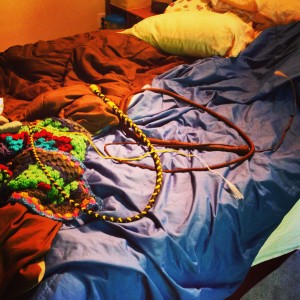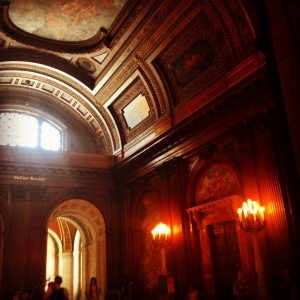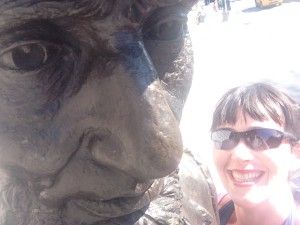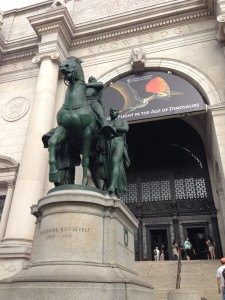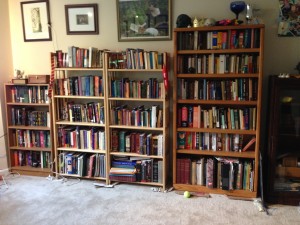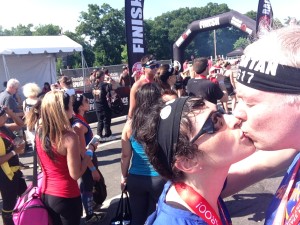In case you’re not tired of this metaphor already, writing a dissertation is like running a marathon.
Now let me be clear: I am a runner. I’m slow, but I’m persistent. That said, my longest distance goal at the moment is a half marathon (which I should hit in the next few months if I keep at it; I’ll be running a 10 Mile race on March 7th; the Salem Black Cat 10 Miler in case you want to join me).
Training to run a long-distance race has many striking similarities to the research and dissertation writing process. First: it comes in chunks. Neither a Marathon nor a Dissertation are finished the day after you decide that you are going to complete them. They take time, dedication, and commitment to accomplish. When you finally do cross the finish line, you will have done something that an overwhelmingly small portion of the population will ever have the opportunity to do.
They both require training and diligence. Increasing your running distance is a matter of patience, fortitude, and attitude; just like increasing your research banks. In both cases, you need to train both hard and smart to accomplish your goal. In both cases, you will often find yourself in vast swathes of the unknown unsure what to do next. In those instances, you need to look to others who have come before; trainers, other athletes, colleagues, friends; people who have been where you are and can advise you accordingly. You’ll need periodic check-ins with professionals; advisors, mentors, and coaches to ensure that you’re on track to meet your goal.
Marathon running, just like dissertation writing, can be an isolating sport. After all, much of the training you do is solitary and so specialized that few will be able to connect with it. But it is precisely for this reason that you need to keep in touch with your community of supporters.
Because not every day is a good day. Not every run is a good run, and not every research session is productive. While some days you’ll be crushing your book stack or your long run with relative ease, other days just putting on your running shoes or getting to your desk will feel like a marathon in and of itself. Some days you’ll be engrossed in what you’re doing and feel invincible; other days you’ll have to take frequent breaks and go so slowly that you’ll wonder if you’re getting anywhere at all.
But that’s where the cheerleaders help. On bad days, they’re there to remind that

At the finish line of the Super Sunday 5 Mile race last weekend
tomorrow will be better and that just by getting up and going for it, you’re getting somewhere. They’re there to reality check your foibles (I mean, really, who should rightfully complain about being able to run 2/3 your final target distance EVEN IF it was slow as molasses and felt awful; or spending an “unproductive” day rooting through archival material older than your country?). They’re there to support you in those bad moments and remind you of the good ones. And you have to learn to trust them and treasure them, no matter how crazy the things they tell you sound in the moment (“What do you MEAN I’m not a failure for missing my deadline/run!? I haven’t missed one YET and thus I FAILED my perfect track record! Never mind that I haven’t missed on yet!”).
Distance running, like dissertation writing, is about micro-goals. Getting out there and doing your short run in a week is just as important to crossing the finish line as your BIG LONG TRAINING RUN before you taper. Getting that first vomit draft out of the way is just as important a milestone as getting the final advisor “Okay” on your last chapter. If you don’t set and meet your micro-goals, there’s no way that you’ll be making it to the finish line.
Dissertation writing, like distance running, is inevitably something that has to give you independent fulfillment. At the end, you will be a leading (if burgeoning) expert in a field of your own devising. This means that few, if any, outside sources will be able to validate the worth of your research in way that will satisfy you if you can’t find that validation within yourself. If you don’t get validation or feelings of elation from running, you will stop before you ever make it close to that finish line.
At the end of the day, dissertation writing, like distance running, is hugely fulfilling. It will mess up your mind as bad as running will mess up your body. It will require self-care and heavy doses of aspiration, perspiration, and determination to conquer. It demands sacrifice, time management, and a strong dose of priority mindedness. But if you can manage it, you can (and will) walk away rightfully feeling like biggest winner the world has ever known.

